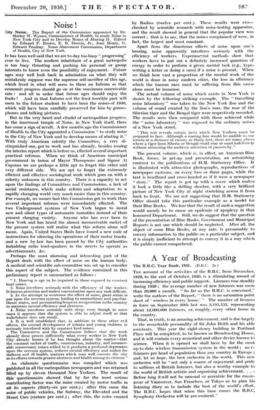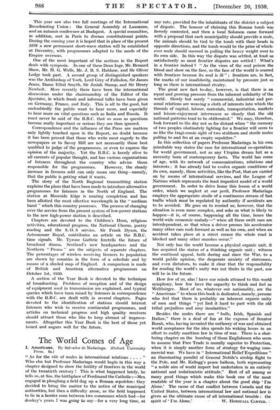A Year of Broadcasting
The B.B.C. Year Book, 1931. (B.13.C. 2s.) THE account of the activities of the B.B.C. from November,- 1929, to the end of October, 1930, is a stimulating record of increasing efficiency and public support. Licences rose steadily during 1930 ; the average number of new listeners was more than 20,000 a month. " So far as the B.B.C. is concerned," write the authors of the Report, " there is no saturation point short of ` wireless in every home.' " The number of licences in force on September 30th last was :3,195,553, representing about 12,000,000 listeners, or, roughly, every other home in the country.
That, in truth, is an amazing achievement, and is due largely to the remarkable personality of Sir John Reith and his able assistants. This year the eight-storey building in Portland Place will be completed, to be known as Broadcasting House, and it will contain every acoustical and other device known to science. When it is opened we shall have by far the most up-to-date wireless transmission system in the world ; mcr.s listeners per bead of population than any country in Europe ; and, let us hope, the best orchestra in the world. This new orchestra will be "not only a source of enjoyment and pride to millions of British listeners, but also a worthy example to the world of British artistic and organising achievement.. . • Before long it will not be unusual or eccentric for the music- lover of Vancouver, San Francisco, or Tokyo so to plan his listening diary as to include the best of the world's effort. The B.B.C. hopes that when this time conies the B.B.C. Symphony Orchestra will be pre-eminent:'
This year saw also two full meetings of the International Broadcasting Union : the General Assembly at Lausanne, and an autumn conference at Budapest. A special committee, in addition, met in Paris to discuss constitutional points. During the coming year it is hoped that in place of the present SSW a new permanent short-wave station will be established at Daventry, with programmes adapted to the needs of the Empire overseas.
One of the most important of the sections in the Report deals with symposia. In one of these Dean Inge, Mr. Bernard Shaw, Mr. H. G. Wells, Mr. J. B. S. Haldane, and Sir Oliver Lodge took part. A second group of distinguished speakers was the Archbishop of York, Lord Grey of Fallodon, Sir James Jeans, Dame Ethel Smyth, Sir Josiah Stamp, and Sir Henry Newbolt. More recently there have been the international discussions under the chairmanship of the Editor of the Spectator, in which frank and informal talks have been given on Germany, France, and Italy. This is all to the good, but undoubtedly the public want to hear more, and especially to hear more on vital questions such as India and Russia. It must never be said of the B.B.C. that so soon as questions become really important or serious they are then ignored.
Correspondence and the influence of the Press are matters only lightly touched upon in the Report, no doubt because it has been proved that those who write most eagerly to the newspapers or to Savoy Hill are not necessarily those best qualified to judge of the programmes, or even to express the opinion of the majority. Yet the B.B.C. is keenly alive to all currents of popular thought, and has various organisations of listeners throughout the country who advise those responsible for the programmes. However, the steady increase in licences sold can only mean one thing—namely, that the public is getting what it wants.
The story of the North Regional transmitting station explains the plans that have been made to introduce alternative programmes for listeners in the North of England. The station at Moorside Edge is nearing completion and has been allotted the most effective wavelength in the " medium band " which this country possesses. The process of changing over the service from the present system of low-power stations to the new high-power station is described.
Chapters are devoted to the Children's Hour, religious activities, educational progress, the National Chorus, poetry reading and the 5. 0. S service. Sir Frank Dyson, the Astronomer Royal, contributes an article on the B.B.C. time signals. Mr. Tyrone Guthrie foretells the future of broadcast drama. Scotland's new headquarters and the Northern " Proms " are the subjects of separate chapters. The percentages of wireless receiving licences to population are shown by counties in the form of a schedule and by means of a shaded map of England. A comparison is made of British and American alternative programmes on October 1st, 1930.
A section of the Year Book is devoted to the technique of broadcasting. Problems of reception and of the design of equipment used in transmission are explained, and typical queries which have been raised by listeners in correspondence with the B.B.C. are dealt with in several chapters. Pages devoted to the identification of stations should interest listeners who wish to receive continental programmes, and articles on technical progress and high quality receivers should attract those who like to keep abreast of improve- ments. Altogether this Year Book is the best of those yet issued and augurs well for the future.







































 Previous page
Previous page